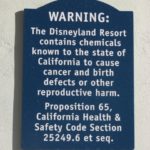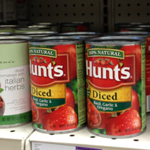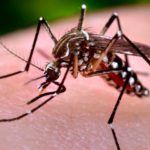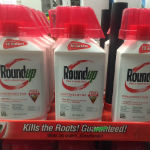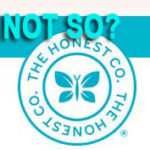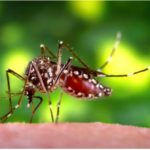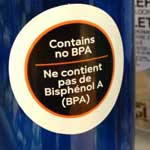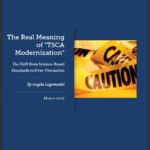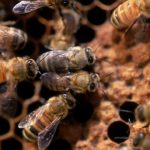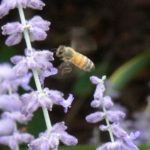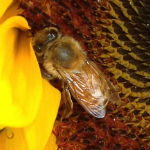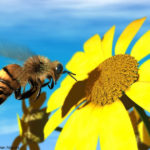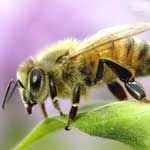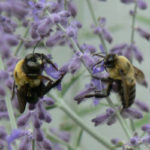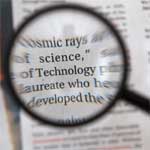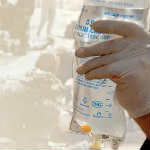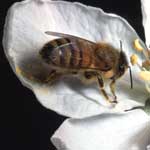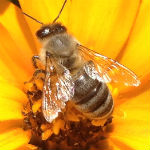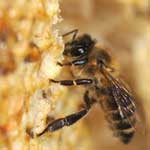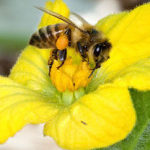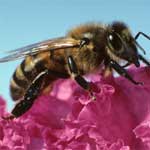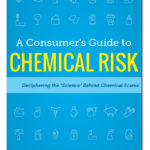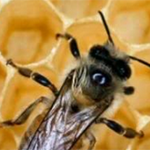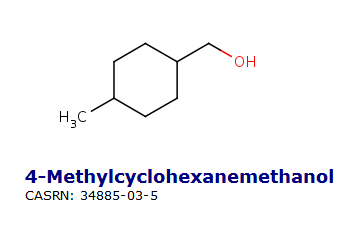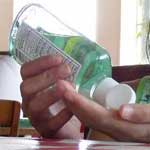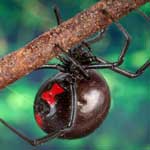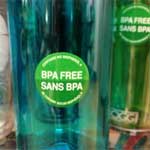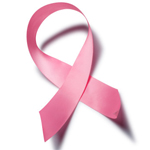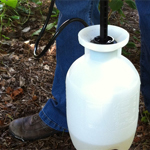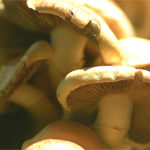"Beware 'Eco-Friendly' Christmas Gifts that Are No Such Thing," By Angela Logomasini, Ph.D. If you are looking to find some eco-friendly holiday gifts and decorations this year, be careful what advice you follow. Intentional or not, many suggestions about “eco-friendly” products are faulty because they are driven more by political preferences than scientific realities. In the words of Austrian economist Ludwig von Mises, there’s an “anti-capitalist mentality” among people on the Left, … [Read more...]
Children’s Environmental Health Grants Fund Junk Science
"Federal Children's Environmental Health Grants Used to Peddle Junk Science," By Angela Logomasini, Ph.D For more than two decades, the federal government has doled out millions of dollars to fund university-based “children’s environmental health centers.” These centers operate under the guise of objectivity, but they are far from objective. They are instead part of a web of left-leaning environmental activist organizations that have long misused taxpayer funds to peddle junk science, leading … [Read more...]
Green Holiday Shopping Advice is Toxic to Your Pocketbook
"Green Movement's Holiday Shopping Advice is Toxic to Your Pocketbook," By Angela Logomasini, Ph.D. As the holiday revelry begins, self-proclaimed “consumer advocates” have sounded the alarm about so-called “toxic toys”—toys that supposedly contain dangerous chemicals. But don’t let them get your spirits down, because their findings are simply not credible, and following their advice could burn a hole your pocketbook faster than the Heat Miser. Near the top of the naughty list is the U.S. … [Read more...]
Shine a Light on Regulatory ‘Dark Matter’
"It’s Time to Shine a Light on Regulatory ‘Dark Matter’" By Angela Logomasini and Henry I. Miller. Regulation is not the only way the federal bureaucracy inhibits innovation. President Donald Trump’s desire to shrink the regulatory state by significantly cutting the number of regulations and their impact is laudable. But it won’t be easy, and it won’t be sufficient, because the federal bureaucracy’s tentacles reach deep into private enterprise through a number of non-regulatory programs and … [Read more...]
Scrap Proposition 65
"Scrap Proposition 65, California's Unscientific Chemical Safety Law," By Angela Logomasini. California may soon list glyphosate, the active ingredient used to make Roundup weed killer, as a carcinogen under the state’s so-called “right-to-know” law, originally passed by voters in 1986 as Proposition 65. Its maker, Monsanto, says it will appeal a recent court ruling that would allow the state to proceed, but they may not be able to stop it, even though the state’s claim isn’t supported by much … [Read more...]
Really Fake News: Chemical Scares
"The 'Fake News' Problem: Health and Safety Edition," By Angela Logomasini, Ph.D. The moniker “fake news” may have entered the mainstream lexicon in 2016, but phony and misleading news stories have always been a problem—and it’s a phenomenon that doubtless will continue so long as the news media continues disguising political opinion as objective fact. Consider the myriad alarmist news stories this past year hyping risks about chemicals. Read more. Save Save Save … [Read more...]
Targeting Unaccountable EPA Programs
"Congress Should Target Unaccountable EPA Programs," By Angela Logomasini, Ph.D. The newly elected congressional majority should be ready and willing to help implement President-elect Donald Trump’s promise to tackle onerous regulations. But what about so called “non-regulatory programs” that have significant public policy and marketplace impacts? Congress can address problems associated with such programs by defunding them or by bringing them under the authority of existing environmental laws. … [Read more...]
War on Women’s Personal Care Choices
"Activists Wage War on Women's Personal Care Choices," By Angela Logomasini, Ph.D. I suspect most women would agree that when you find a skin care product that works, you stick with it. But activist groups are waging war against many key ingredients in our personal care regimens based on highly speculative and questionable science. Both regulators and manufacturers are responding with product bans or “voluntary” product reformulations, leaving women with fewer options. For example, you may soon … [Read more...]
Misleading BPA Warning Labels on Canned Food
"WARNING: BPA Warning Labels Threaten Public Health," By Angela Logomasini, Ph.D. The state of California has extended an emergency rule that allows companies to wait until January 2017 before placing a warning on the label of food packaging containing the chemical Bisphenol A. Supposedly, BPA poses a health risk that demands this warning label, under California’s Proposition 65 law. Rather than place the warning label on the packaging, stores must post signs that BPA may pose health risks and … [Read more...]
Zika Prevention Kit
"The Best Possible Zika Prevention Kit Includes DEET," By Angela Logomasini, Ph.D. Last week, Broward Country Florida recorded the first two Zika cases transmitted by mosquitos in the United States. The Centers for Disease Control and Prevention (CDC) is urging pregnant women to assemble and deploy a “Zika Prevention Kit,” which is a good idea. CDC’s suggested kit includes: bed nets; insect repellent; mosquito dunks, which are added to standing water to prevent development of mosquito larvae; … [Read more...]
Action to Help Monarch Butterflies
"Don’t Give up on the Monarch Butterfly!" By Angela Logomasini, Ph.D. Last winter, monarch butterfly numbers soared, increasing by more than one-third in their overwintering habitat. Yet we are well into July, and while my milkweed garden has been abuzz with bees feasting on the nectar, there’s no sign of any monarchs or their caterpillars. I am probably not alone in my dismay, but hopefully butterfly enthusiasts won’t give up—at least I won’t. According to MonarchWatch.org, storms this past … [Read more...]
Glyphosate Politics
"Rounding Up the Cowards: EU Leaders Block Glyphosate," By Angela Logomasini. As reported in the Wall Street Journal this week, yet another valuable pesticide product may eventually be removed from the market place. But despite the Journal’s assertion that the controversy stems from uncertain science, the real source is politics. Too many European lawmakers are afraid to take a stand that might offend environmental activists, even though inaction will raise food prices and hinder … [Read more...]
TSCA Reform Paused
"One Enlightened Statesman: Sen. Rand Paul Pauses TSCA Bill," By Angela Logomasini, Ph.D. Three cheers to Senator Rand Paul for actually caring enough to read legislation before voting on its passage. Last week, he held up legislation that will vastly expand the Environmental Protection Agency’s power to regulate chemicals. As I pointed out recently, this legislation to amend the federal Toxic Substances Control Act (TSCA) has been moving along without proper consideration from most members of … [Read more...]
EPA “Inadvertently” Admits: Glyphosate “Not Likely” a Carcinogen
"EPA (sort of) Admits: Glyphosate Not Likely Carcinogen," By The Center for Accountability in Science Team. A few days ago, the U.S. Environmental Protection Agency (EPA) published a report concluding glyphosate is unlikely carcinogenic to humans. The EPA pulled the report not long after, telling Reuters it was “because our assessment is not final”— it had been published “inadvertently.” Reuters noted, however, that the accompanying memo was labeled “Final.” The report is expected to be … [Read more...]
TSCA Consensus May Prove Toxic
"TSCA 'Reform': Consensus May Again Prove Toxic," By Angela Logomasini. According to a story in Bloomberg BNA, a final vote on legislation to reform the nation’s chemical law—the Toxic Substances Control Act—may be imminent. The story quotes Senator James Inhofe (R-Okla.), who explained at a congressional hearing the other day, “It looks like now we’re [the U.S. Senate Environment and Public Works Committee] just a matter of hopefully hours away of having an agreement with the House.” The … [Read more...]
Devil in the Details of TSCA Modernization
"The Devil, the Details, and 'Consensus' for 'TSCA Modernization,' Angela Logomasini. For some reason, there’s always near “consensus” when Congress passes environmental laws that later become controversial (for data, see my study from 2008 on this topic). There are probably two key reasons for this. First, no member wants to appear “anti-environmental” by voting against “green” legislation; and second, few members are paying much attention to the details. And that’s what appears to be … [Read more...]
Reality Check for the Chemical Industry
"Trust in Government: A Bad Strategy for the Chemical Industry," by Angela Logomasini, Ph.D. There is a reason why people laugh when you say: “Trust me, I come from the government.” Governments are not particularly trustworthy because bureaucracies are not particularly efficient, and when they are efficient, there’s sometimes more reason to fear than trust. Yet for the past several years, the chemical industry has been trusting the idea that giving more power to feds will save them from a … [Read more...]
Alarmism, not Science, Guides Debate on Flame Retardants
"Outdated Science And Alarmism Drives Flame Retardant Debate," By Angela Logomasini. Learning from history should keep us from repeating our mistakes. Yet when it comes to environmental politics, the opposite seems to be true. History and improved scientific understanding fail to inform, while alarmism and irrational fears drive policy. The current debate related to flame retardant chemicals is a prime example. Environmental activist groups have petitioned the Consumer Product Safety … [Read more...]
Not So Green Products
"Shady Marketing Claims for "Green" Cleaning Products," by Richard Morrison. The Wall Street Journal reports today on the murky world of marketing for “green” and “natural” household products. Ads for these flower-scented and creatively-named brands often claim—or, at least, strongly imply—that they are safer and healthier that mainstream cleaning and deodorizing agents. Such claims are often made even when both products are chemically similar or borderline identical. Read more. … [Read more...]
Do We Need Government Flammability Standards for Furniture?
"Doing Away with Government Flammability Standards," By Angela Logomasini. During the past several years, there’s been much hype in the news alleging that flame retardant chemicals used on upholstered furniture pose unacceptable health risks. With these alarmist claims abounding, some green minded individuals complain that they unknowingly purchased couches that contain these chemicals because furniture manufacturers apply them to meet government flammability standards. To address this concern, … [Read more...]
The Roundup on Life-Saving Weedkillers
"Glyphosate Saves Lives, Reduces Child Labor, and More," By Angela Logomasini. David Zaruk, aka the Risk Monger, has produced an excellent series of blog posts on why the herbicide glyphosate (the active ingredient in “Roundup”) is a wonderful thing, despite “cancer classifications” and demonization by greens. In a refreshingly blunt and honest series of posts, he makes some fantastic points that must shock green activists who can’t imagine why anyone would dare use a chemical to control … [Read more...]
Zika: Part of a Much Bigger Public Health Problem
"Zika Wake-Up Call," by Angela Logomasini. The spread of the mosquito-transmitted Zika virus should be yet another wake-up call for public officials around the world. As a relatively new threat, Zika has captured headlines in a world where many insect-transmitted diseases continue to wreak havoc on public health. Unfortunately, the ability to control all such vector-borne diseases is hindered by more than our limited scientific understanding. Disease control is limited by the lack of political … [Read more...]
Dismiss Christmas Toy Alarmism
"Holiday Toy Safety: Common Sense Trumps Activist Advice," By Angela Logomasini. If you believe the U.S. Public Interest Group (USPIRG), the “Slinky Jr.” or “Fun Bubbles Jump Rope” that Santa might bring to your children should send shivers down your spine. These items are among the “toxic” toys listed in the group’s annual “Trouble in Toyland” report. But don’t fret, because the only thing that’s really troubling is USPIRG’s alarmism. Read more. … [Read more...]
Processed Meat and Cancer Baloney
"Baloney About Processed Meat and Cancer," By Angela Logomasini. Scientists from around the world convened in Lyon, France--a city famed as the world's gastronomical capital--this October to declare that local delicacies, such as andouille sausage and pork salami, are now classified carcinogens, placing them in the same category as smoking. The absurdity of that conclusion highlights the growing futility of efforts to classify certain chemicals, foods, and activities as either "carcinogenic" … [Read more...]
Weed Killers in Tampons
"Glyphosate in Tampons, Oh My!" By Michelle Minton. You may have seen the hilarious headlines about putting Monsanto in your vagina (if not, you’re welcome/I’m sorry). This hyperbole comes on the heels of a new study showing that the majority of cotton products tested by Argentinian researchers were found to contain glyphosate—the herbicide made by Monsanto and commercially known as Roundup. Even if you’re comfortable with farmers spraying crops with chemicals that keep away insects or … [Read more...]
Questionable Reasons for TSCA Reform
"The Many Bad Reasons to Support TSCA "Reform," By Angela Logomasini. With reform to nation’s chemical law—the Toxic Substances Control Act (TSCA)—basically around the corner, groups from both left and right are commenting on why we need reform and for some, why the current proposals should pass quickly. But the reasons they offer aren’t are very compelling. The Consumer Electronics Association (CEA) exclaims in a press release: Read more. … [Read more...]
Government Funded Junk Science and BPA Alarmism
"Taxpayer-Funded Anti-BPA Activism is the Real Danger," By Angela Logomasini, Ph.D. Alarmist claims about the chemical Bisphenol A (BPA) have reached an absurd level. According to the website Treehugger.com, a new study shows that exposure to BPA can make humans lazy and eventually obese from lack of exercise. Such claims continue to populate the Internet thanks to taxpayer funded junk-science studies about this chemical. Read more. … [Read more...]
TSCA “Reform” on the Way
"'Reforming' the Toxic Substances Control Act," By Angela Logomasini. As early as this week, the Senate is slated to take up a bill to reform the Toxic Substances Control Act. Supposedly, the proposal has enough bipartisan support to sustain a filibuster. So are the proposed changes to TSCA good or bad for consumers? There are plenty of reasons to be skeptical. As I have explained numerous times, the current TSCA has what is probably the best standard for evaluating environmental risks that the … [Read more...]
Market Demand Ensures Honeybee Survival
"How Markets Benefit Honeybees and Mankind," By Angela Logomasini, Ph.D. After more than a decade of panicked reports about honeybees disappearing and potentially going extinct because of a phenomenon called “colony collapse disorder,” The Washington Post reported last week that the number of hives in the United States has reached a 20 year high. At the same time, I was making presentation at a meeting of the American Legislative Exchange Council, explaining that globally, there are more … [Read more...]
“BPA-Free” Cans No Safer than Alternatives
"Green Advice On Canned Foods Belongs In The Trash," By Angela Logomasini, Ph.D. Go to the supermarket and you may notice canned food bearing the label “BPA-free.” It doesn’t mean those products are any better than others—although they may be more expensive. Environmental activists spawned the nonsensical demand for Bisphenol A-free packaging by focusing on spin rather than science. The latest example is the Environmental Working Group’s (EWG) report, “BPA in Canned Food: Behind the Brand … [Read more...]
Kudos to McClintock
"Kudos to Rep. Tom McClintock for His Principled Stand," by Angela Logomasini, Ph.D. Last night, the U.S. House of Representatives passed its version of TSCA reform (H.R. 2576) by a roll call vote of 398 in favor, one opposed, and 34 members not voting. Yesterday, I lamented the fact that this bill was pushed through under suspension of the rules, which is supposed to be for low-cost, non-controversial bills, which is something that TSCA reform certainly is not. In any case, the issue is very … [Read more...]
TSCA Bill Reaches House Floor
"Suspending Reason to Pass 'TSCA Reform'" by Angela Logomasini The process of lawmaking is often compared to sausage making: an unpalatable job that produces a palatable result. It’s easy to agree with the first part of that analogy, but in politics, the result isn’t always pleasant. Today, U.S. House of Representatives is scheduled to “suspend the rules” and pass its version of reform to the Toxic Substances Control Act (TSCA). This cursory approach is another example of the suspension of … [Read more...]
Pork-Barrel and the Pollinators “Strategy”
"Of Pork-Barrel and Pollinators," By Angela Logomasini, Ph.D. The Obama administration has finally released its long-awaited National Strategy to Promote the Health of Honey Bees and other Pollinators. It’s the federal government’s answer to the alarming claims that honeybees are disappearing, threatening many crops that rely on the bees for pollination. While it’s not clear what this strategy will achieve for the bees, we can be sure it comes with lots of government handouts, pork-barrel … [Read more...]
Honeybees and Pork-Barrel Politics
"Saving the Bees vs. Pork Barrel Spending," By Angela Logomasini. The Obama administration has finally released its "National Strategy to Promote the Health of Honey Bees and Other Pollinators." It's the federal government's answer to all the hype found in the news related to the health of the nation's honeybee hives. While it's not clear what it will achieve for the bees, we can be sure it comes with lots of pork-barrel spending, government handouts, and shortsighted pesticide polices that … [Read more...]
Honeybee Policy Should Use Facts not Alarmism
"U.S. Pollinator Policy Should Focus on Facts Rather than Alarmism," By Angela Logomasini, Ph.D. The House Agriculture Subcommittee on Biotechnology, Horticulture and Research held a a hearing on “pollinator health” on May 13 to discuss a national strategy designed to improve honeybee health. Hopefully, U.S. regulators and legislators will not move too quickly on a strategy that is governed by alarmism; rather, they should take a deliberative approach that is based on science and good … [Read more...]
Honeybee Nonsense
"On Bee Enslavement and Other Nonsense," By Angela Logomasini, Ph.D. I’ve seen many crazy headlines about the challenges facing honeybees, but this one takes the cake: “Bee collapse is the result of their enslavement in industrial monocultures.” So now, not only are humans “killing off” bees, we are “enslaving” them! According to this article, “industrial agriculture” is the problem and technological approaches won’t help things. However, the authors don’t offer much of any solution other … [Read more...]
The Politics of Regrettable Substitutions
"How Does the Government Decide What Is — and What Is Not — ‘Toxic’?" By Henry I Miller, M.D., MS and Angela Logomasini, Ph.D. An increasingly frequent and worrisome phenomenon that unnecessarily threatens human health and the natural environment is “regrettable substitutions,” which refers to bans or limitations on certain products, even though the alternatives might pose risks that are uncertain or greater. It calls to mind the old saying “out of the frying pan and into the fire.” Today, … [Read more...]
What’s Really Threatening Honeybees
"Rash Regulation Is What's Really Threatening Honeybees," Angela Logomasini. The honeybee is a powerful symbol of nature’s generosity given that these industrious critters pollinate crops around the world. Green activist groups and others are capitalizing on that symbol to spread fear and misinformation—to advance an unrelated crusade against agrochemicals. Unfortunately, if regulators continue to accept activist-generated spin, not only will food production suffer, honeybees will as well. This … [Read more...]
Private Action Will Help the Bees
Today, the Competitive Enterprise Institute published my paper on the honeybee health issue and pesticide use. We have had several media outlets ask, why is CEI focused on the honeybee issue now? If you read this blog, you know that I have been writing about pesticides and their impact on public health and well-being for at least a decade and a half. CEI selects issues based on our goals to promote freedom and prosperity, using the market to advance public health and well-being. I focus on … [Read more...]
No Safety Reason for TSCA Reform
"TSCA Reform Debate Is Not about Public Safety," by Angela Logomasini. At recent hearings on the the Frank R. Lautenberg Chemical Safety for the 21st Century Act (S. 697), senators, environmental activists, and local government officials claimed that the Toxic Substances Control Act (TSCA) law is not sufficient protect public health. As I have argued before, that’s certainly not the case.There may be an economic reason to reform this law—to preempt a growing patchwork of nonsensical state-level … [Read more...]
Arsenic in Wine
"Arsenic in Wine: Dangerous or Beneficial?" by Angela Logomasini. Dan Nosowitz in Modern Farmer offers some insights on the recent class action lawsuit filed against California winemakers. The plaintiffs found that some inexpensive wines contained arsenic at levels exceeding the federal drinking water standard for this substance. Nosowitz rightly points out that the standard is for water, not wine and “people don’t, or shouldn’t, drink as much wine as water.” Read more. … [Read more...]
CPSC’s Selective Use of Data for Phthalates Study
"Data Torturing at the CPSC," By Angela Logomasini. James Mills of the National Institute of Child Health and Human Development lamented in an article in the New England Journal of Medicine back in 1993: “‘If you torture your data long enough, they will tell you whatever you want to hear’ has become a popular observation in our office. In plain English, this means that study data, if manipulated in enough different ways can prove whatever the investigator wants to prove.” Government regulators … [Read more...]
CPSC’s Scientific Shenanigans
" CPSC's Scientific Shenanigans on Phthalates," Angela Logomasini. Many “stakeholders” have complained about the process through which the Consumer Product Safety Commission (CPSC) developed its proposed rule related to a class of chemicals called phthalates—and rightly so. In particular, the agency’s failure to allow public comment and open peer review of its Chronic Hazard Advisory Panel report (CHAP report) underscore the fact that bureaucrats want to avoid scrutiny that might hold them … [Read more...]
CPSC Proposal on Phthalates Likely Harm
"CPSC Proposal on Phthalates Likely to Do More Harm than Good," by Angela Logomasini. On Monday, the Consumer Product Safety Commission will close the comment period for a proposed rule related to chemicals used to make soft and pliable plastics. While they claim to do this in the name of children’s health, it’s not clear that the rule will do more good than harm. The process and the “scientific” review that brings us to this proposed rule has been controversial, to say the least. I detail … [Read more...]
BPA in Food Packaging is Safe Safe Even for Kids & Babies
"European Food Safety Authority Confirms BPA Safety—Again," By Angela Logomasini on CEI.org. The debate over the chemical Bisphenol A (BPA) has raged for years, with environmental activists continually hyping the risks associated with it. Used to make hard-clear plastics and resins that line food containers such as soda cans or canned fruits and veggies, humans have been exposed to trace levels of the chemical for decades without evidence of any ill effects. And a recent review of the science … [Read more...]
Costs of Green Chemistry
"Consumers to Pay the Price for State Environmental Regulations," by Angela Logomasini. Consumers could soon face higher prices, reduced choices and lower-quality products, thanks to a slew of chemical regulations that are advancing in various states. These regulations are unlikely to provide any measurable benefits, and instead would reduce consumers’ access to a myriad of products, from children’s toys and canned food to paint and building materials. These regulations, pushed largely by … [Read more...]
Activist Science and Honeybees
"Activist Science Undermines Research on Honeybees and Pesticides," by Angela Logomasini. As reported in a blog post by David Zaruk, some of the “science” on the impact of neonicotinoid pesticides on honeybees appears to have resulted from a pre-orchestrated campaign, rather than an unbiased scientific process. The researchers involved are members of the International Task Force on Systemic Pesticides, which is part of the International Union for Conservation of Nature (IUCN). The task force … [Read more...]
No Effect of Neonics in Field Study of Honeybees
"New Field Study Confirms Neonicotinoids Have Little Impact on Honeybees," By Angela Logomasini. As the Ontario provincial government in Canada considers policies that may force farmers to stop using, or drastically reduce use of, a class of pesticides called neonicotinoids, a new study shows why such policies are unlikely to do any good. Supposedly, limiting use of these pesticides will improve honeybee hive health, but such regulations will simply make it harder for farmers to produce an … [Read more...]
BPA-Related Junk Science Linked to Federal Spending
"BPA Research Funding Linked to Researcher Bias?" by Angela Logomasini. The number of studies that have appeared in the news during recent years on the chemical bisphenol A (BPA) is staggering. Few substances undergo such scrutiny. So why BPA? Mattie Duppler of American’s for Tax Reform’s Cost of Government project answers that question in an article for The Hill’s Congress Blog: Congress has poured millions of dollars ($170 million since 2000) into BPA research for what amounts to little more … [Read more...]
Are Honeybee Populations Really Declining?
"Honeybee Population in Decline—Or Not?," By Angela Logomasini, Ph.D. If you read the news about honeybee survival, it’s all very confusing. Some sources sound the alarm by pointing out that the number of honeybee hives has dropped significantly in recent decades. Others say just the opposite: There are more hives today than ever before. Which is it? Actually, both. Read more. … [Read more...]
Ban on BPA Resins May Increase Food-Borne Illnesses
"Greens' Attempt To Ban Bisphenol A Will Endanger Public Health," By Angela Logomasini. Thanks to green alarmism, Sen. Ed Markey (D-Mass.) recently introduced the “Ban Poisonous Additives Act of 2014,” which would eliminate the chemical Bisphenol A from food containers. Applauding Markey’s bill, the Environmental Working Group exclaimed in a press statement: “Science shows that BPA is present in the vast majority of Americans and is harmful to human health.” Yet the overwhelming body of … [Read more...]
Human Efforts Will Save the Honeybees
“'Tampering' with Nature to Save Honeybees," By Angela Logomasini. Environmental groups are calling for an immediate suspension of an entire class of pesticides in order to save ailing honeybee populations—and they won’t wait for results of a recently launched federal effort to study the problem. But the greens' strategy won’t help the honeybees because it targets the least likely cause of recent beehive losses and ignores the more likely ones. Underlying the activists’ ban-now-think-later … [Read more...]
Honeybee Health and Headlines
"Good News and Bad News about Honeybees," By Angela Logomasini. News stories related to honeybee health the past few weeks are all over the map. Some headlines claim that new research proves that honeybees are dying off because of pesticides, while others say honeybees are doing just fine. But reality is different than either scenario. Beekeepers surely have their challenges, but banning pesticide's won't help them or their bees. Much of the media "bad news" comes from a recent Harvard … [Read more...]
Rash Regulation May Harm Honeybee
"Regulate-First-Think-Later Approach to Harm Honeybees," by Angela Logomasini. European bureaucrats placed a two-year ban on a class of pesticides in the name of “protecting honeybees” when in fact, as one EU official recently admitted, they didn’t have evidence that the chemicals present a serious threat to honeybee health. According to an article in Food Chemical News, the European Commission official admitted that the government banned the chemicals simply because it was “the only factor” … [Read more...]
Findings of Honeybee Health Study Encouraging
"Encouraging News about Honeybee Health," By Angela Logomasini. A recently released study in Europe reports some good news about honeybee health, which should prompt public officials to reexamine a recent ban on some agricultural products. “It’s the first major study of pests and diseases that affect honeybees. A lot of it seems very encouraging,” honeybee researcher Tom Breeze, says in a Reuters news story. The study examines honeybee populations in Europe after recent disappearances of entire … [Read more...]
Consumers’ Guide to Chemical Risk
"Science Facts and Chemical Scares," By Angela Logomasini. Will these chemicals make me fat? That sounds like a weird question, but some consumers may actually have such worries, thanks to a constant barrage of news headlines suggesting that synthetic chemicals—an even some naturally occurring ones—are responsible for nearly every public health problem imaginable. This website and CEI‘s A Consumers Guide to Chemical Risk: Deciphering the “Science” Behind Chemical Scares booklet are designed … [Read more...]
Beekeeper: Alliance with Greens is Counter-Productive
"Beekeeper Speaks Out Against Anti-Pesticide Campaigns," By Angela Logomasini. Anyone worried about honey bee survival should read the piece by Canadian beekeeper Lee Townsend in the Guelph Mercury newspaper. In recent years, beekeepers have seen some of their hives disappear without much explanation, a phenomenon referred to as”colony collapse disorder.” Green activists have used this situation to randomly initiate bans on various pesticide products in the name of saving the bees, and their … [Read more...]
Book Review: From Cupcakes to Chemicals
"Julie Gunlock' s From Cupcakes to Chemicals," book reviewed Angela Logomasini. “I was going to be an earth mommy — with my baby secured in my organic cotton baby sling, wandering around the farmers market, making friends with the butcher, the baker and the candlestick maker,” says Julie Gunlock in her new book, “From Cupcakes to Chemicals: How the Culture of Alarmism Makes us Afraid of Everything and How to Fight Back.” However, that’s not what happened. Mrs. Gunlock did her homework and … [Read more...]
JAMA Junk Science
"JAMA’s Dangerous Hype: BPA and Cash Register Receipt Research Letter," By Angela Logomasini. This month’s issue of the Journal of the American Medical Association (JAMA) contains a “research letter” on a “study” conducted by researchers at Harvard University that says: "[W]e observed an increase in urinary BPA concentrations after continuously handling receipts for 2 hours without gloves, but no significant increase when using gloves." And given these “findings” the headlines declare that … [Read more...]
Formaldehyde Hype and WVA Chemical Spill
"West Virginia Chemical Spill and Formaldehyde Hype," by Angela Logomasini. In this final post on my series related to the January 9 chemical spill in West Virgina, I address wrongheaded claims that the spill also exposed Charleston residents to dangerous levels of formaldehyde. A few weeks after the spill, West Virginia Environmental Quality Board Vice Chairman Scott Simonton alleged that final traces of crude MCHM are breaking down and exposing residents to dangerous levels of formaldehyde. … [Read more...]
Communication Failures and the West Virginia Chemical Spill
"Uncertainty and the West Virginia Chemical Spill," By Angela Logomasini on February 14, 2014. In the aftermath of the January 9 chemical spill in West Virginia, environmental activists claim: “More than two weeks after the spill, the answer to most questions about the spill and the chemicals in it is either that ‘we don’t know’ or that the information is incomplete.” Green groups make such claims to capitalize on the fact that everything in life has some uncertainty. But that does not mean … [Read more...]
TSCA Reform Not the Answer to the Chemical Spill
"TSCA Reform Won’t Reduce Chemical Spill Risks," By by Angela Logomasini. The January 9 chemical spill in West Virginia, which temporarily contaminated the Charleston drinking water supply, has rekindled a debate related to federal chemical regulation. Clearly, this case — and another spill that occurred this week in West Virginia — demonstrates the failure to properly implement the many emergency planning and prevention laws and programs already on the books. And this is a problem that state … [Read more...]
We Have Enough Information to Manage Chemical Spill Risk
"West Virginia Chemical Spill: We Have Enough Information to Manage the Risk," By Angela Logomasini. In a prior post, I addressed the background related to the recent chemical spill that contaminated drinking water in West Virginia, and I highlighted why more regulation would not do much good. But we continue to hear that we need more regulation because we don’t have enough information about this chemical and thousands of others. Such claims divert our attention from the real issue: failure to … [Read more...]
Chemical Spill Does Not Signal Need for More Regulation
"More Regulation Is Not the Answer to West Virginia Chemical Spill," by Angela Logomasini. The recent chemical spill in West Virginia has green groups clamoring for more regulation, including expansion of Environmental Protection Agency power under the Toxic Substances Control Act. Early on, however, Democratic Senator Barbara Boxer of California rightly told the press, “We can fix this now” using existing laws rather than passing new ones. Boxer’s strong opposition to the current TSCA reform … [Read more...]
Foolish Attack on Antibacterial Products
"The Green Campaign against Triclosan is Dangerous and Regressive," By Angela Logomasini. Environmental activists have sounded the alarm suggesting that consumers face serious health risks from the antibacterial chemical triclosan, which manufacturers have safely used in soap and other personal care products for decades. Unfortunately, green hype has led federal regulators to force companies to try to do the impossible—prove that their products pose no risk or remove them from the market. But … [Read more...]
Dangers Associated with Potential Ban on Anti-Bacterial Soap and Gels
"Immune Compromised Patients Will Suffer from Anti-Bacterial Soap Ban," By Angela Logomasini. Many people with compromised immune systems use antibacterial soaps and gels, particularly when they’re on the go, to reduce health risks. But environmentalists have launched a campaign to ban triclosan, the active ingredient in these soaps. That action would do nothing for public health while thwarting consumer access to helpful products. These anti-chemical groups have so demonized triclosan by … [Read more...]
Why Pesticides Should be a Favorite Thing
"Why Anti-Pesticide Campaigns do Unintended Harm," by Angela Logomasini. Black spots on roses and flea bites on kittens; blight fallen petals and overwrought Britons. These are just a few unfavorable things associated with “green” attacks on pesticides. While pesticides have risks that must be managed, they also provide important benefits to farmers, gardeners and consumers. These benefits are being lost in a politically correct sea of regulations and blind support for everything “organic.” … [Read more...]
BPA Headaches and Bottled Water
"BPA Junk Science Headaches," by Angela Logomasini. Could your affection for bottled water be responsible for your bout with migraines? Apparently so, if you believe the latest headlines about the chemical bisphenol A (BPA). But its wise to be wary of such silly claims. First of all, it’s wrong to suggest that single serving bottled water commonly contains BPA, because that’s simply not true. BPA is not used for single-serving, flexible plastic water bottles, as pointed out on the … [Read more...]
Chemicals “Lurking” in Your Turkey-Day Menu?
"Disregard Toxic Advice on Turkey Day," by Angela Logomasini. Toxic chemicals lurk in the “typical” Thanksgiving meal, warns a green activist website. Eat organic, avoid canned food, and you might be okay, according to their advice. Fortunately, there’s no need to buy this line. In fact, the trace levels of man-made chemicals found in these foods warrant no concern and are no different from trace chemicals that appear in food naturally. The American Council on Science and Health (ACSH) … [Read more...]
Chemical Alarmists’ Vocabulary
"An Alarmist Vocabulary: Chemical Is 'Linked To,' 'Study Suggests,' 'Consistent With,' by Angela Logomasini Headlines continue to appear to claiming that a recent study has shown that the chemical bisphenol A increases the risk of miscarriage, which I addressed in a Forbes article last week. There are many problems with this research, such as the fact that it is not available in a published, peer-reviewed format. Check out my piece here for more details. This issue raises a bigger concern … [Read more...]
Green Hype Undermines Breast Cancer Awareness
"Enviro Scare Tactics Undermine Breast Cancer Awareness Month," by Angela Logomasini. October is “breast cancer awareness month” thanks to a collaborative campaign arranged by public and private groups united in the mission to fight breast cancer. Their educational efforts can save lives by promoting early detection and healthy lifestyle choices. Yet environmental activists and media are using this campaign as an excuse to scare women about chemicals, and unintentionally, divert their attention … [Read more...]
Dangerous Results of Anti-Chemical Technology Hype
"Green Policies Translate Into Less Food, Higher Prices," by Angela Logomasini. Thanks to misguided bureaucracy and fear mongering from environmental activists, myriad valuable products are disappearing from the marketplace. Walmart, Proctor & Gamble, and Johnson and Johnson are leading the way by following green advice to phase out a host of valuable chemical technologies because of misinformed green hype. Pesticides—which are needed to feed a growing world population and fight … [Read more...]
Green Attacks on Consumer Choice
"Green Market Pressure Takes Toll on Consumer Choice," by Angela Logomasini. When environmentalists don’t have the political power to regulate away consumer choice, they sometimes can get industry to do the job for them. Most recently, Proctor and Gamble (P&G) has decided to phase out the chemical triclosan, which has been used in a wide range of soap products to reduce risks from bacteria. P&G’s announcement follows other dumb triclosan phase outs that Colgate Palmolive (2011) and … [Read more...]
Scientists Take Stand Against Junk Science
"Scientists Warn of Dangers of 'Precautionary Science,'" by Angela Logomasini. Eighteen scientists recently weighed in on the unscientific and dangerous nature of the so-called “precautionary principle” in the July issue of the journal Food and Chemical Toxicology. The article follows on the heels of a substantially similar letter to the EU president’s Chief Scientific Adviser that dozens of scientists signed in protest of the European Union’s draft regulation on endocrine active chemicals. … [Read more...]
NYS Bureaucrats Contribute to Tick Problem
"New York State Bureaucrats Block Lyme Disease Control," by Angela Logomasini. As Americans gather outdoors to celebrate the 4th of July, ticks are also out — and in record numbers — particularly in certain places like the East End of Long Island. According to the Sag Harbor Express, New York State Department of Health officials recommend that individuals protect themselves by staying inside (the Health Department website does offer some more useful advice). Seriously, that’s just dumb, … [Read more...]
Pesticide Workers’ Low Cancer Risks
"Cancer Rates Low Among Pesticide Workers," by Angela Logomasini. If chemical exposures are a significant cause of cancer, as some environmentalists say, you’d expect that individuals who apply pesticides for a living would have higher cancer rates. But a recent study conducted by the U.K.-based Health and Safety Laboratory indicates, that’s not the case—at least not for pesticide workers. The study looked at mortality among 59,085 male and 3,875 female commercial pesticide applicators, and … [Read more...]
IWF to Retailers: Mind Consumer Rights
"Retailers Should Keep Consumers — Not Greens — In Mind," by Angela Logomasini. As part of its Culture of Alarmism project, the Independent Women’s Forum (IWF) has recently launched a coalition letter – which includes CEI — to retailers to combat the greens so-called “Mind the Store“ campaign. We (IWF, CEI, and 21 other groups) advise retailers to ignore radical greens’ advice to remove certain products from store shelves, and instead honor consumer freedom. Read the full article at … [Read more...]
Junk Science, EWG, and FOX News
"Surprising Junk Science on FOX News," by Angela Logomasini. News stories trumping junk science are common, but I expect better from FOX News, which claims to be “fair and balanced” and hosts great shows like STOSSEL. And they’ve run some of my commentaries, which I appreciate. That’s why I am perplexed by some FOX reports on environmental issues, many of which seem to peddle junk science pushed by activists at the Environmental Working Group (EWG). Read the full article on OpenMarket.org. … [Read more...]
Cancer Clusters and Chemicals
"The Cancer Clusters That Weren’t," by Angela Logomasini A recent post in ACSH Dispatch examines an interesting question: How likely is it that some U.S. communities have elevated cancer rates, a.k.a, “cancer clusters,” because of chemical pollution? The answer: not very. ACSH points to an enlightening article published in Slate by George Johnson, who notes: Read the full article on OpenMarket.org. … [Read more...]
Bureaucratic Green Chemistry Advances In California
"New Green Rules In California Take Safe Chemicals Out Of Use," By Angela Logomasini If at first you don't succeed, try, try again. That's the approach California bureaucrats are taking to implement the state's 2009-passed "green chemistry" law. Unfortunately, if they do eventually succeed, it could cost consumers and the economy dearly. Read the full article at Investors Business Daily. … [Read more...]
Breast Cancer Study Sets Misguided Priorities
"Breast Cancer Victims Suffer From Foolish Priorities," by Angela Logomasini. In government, political priorities often supersede science and good health policy. In fact, a recent government report may shift funding away from useful research to study the most unlikely causes of breast cancer. More women will suffer in the future than necessary as money for useful research shrinks. Read the full article on OpenMarket.org. … [Read more...]
Impact of Chemical Regultion on Animal Testing
"TSCA Reform: Reasonable Certainty of Harm to Animals," By Angela Logomasini. European animal rights activists made a big mistake in 2006 when they failed to fight passage in the European Union of REACH, which is short for Registration, Evaluation, and Authorization of Chemicals. Now that the U.S. Congress may soon consider a similar law, will American animal rights groups fight it or repeat the mistakes of their European counterparts? Read the full story on OpenMarket.org. … [Read more...]
Atrazine: Risks Low, Benefits High
"Herbicide Poses No Cancer Risk In Drinking Water," by Angela Logomasini. Over the years, the Environmental Working Group (EWG) and the Natural Resources Defense Council (NRDC) have repeatedly issued bogus reports claiming that Americans face serious cancer risks from trace chemicals found in drinking water. A new study challenges their claims regarding one of these activists’ key targets: the herbicide atrazine, which farmers use to control weeds rather than tilling the soil. Read the full … [Read more...]
Faulty Cancer Scare Related to Styrofoam Cups
"Cancer Risks Unlikely From Foam Cups," by Angela Logomasini. Whatever happened to plastic foam coffee cups? Visit any to-go coffee shop and you will most likely only find paper cups that burn your hands and let your coffee go cold. Cups made with polystyrene foam are disappearing from the marketplace because a bevy of misinformation about their environmental effects, including claims styrene — the chemical used to make them — is a carcinogen. Read the full article on OpenMarket.org. … [Read more...]
Cloth Supermarket Bags Can Transmit Illness
"Germs In Reusable Grocery Bags Can Prove Deadly," by Angela Logomasini. Cloth supermarket bags may be fashionable, but they can also prove deadly, according to a recent research paper published by the University of Pennsylvania Law School. The researchers point out that after the city of San Francisco banned plastic bags, the number of emergency room visits for bacterial related diseases increased significantly. Read the full article on OpenMarket.org. … [Read more...]
Greens Complain About “BPA Free” Bottles
"Greens Complain About BPA-Free Products They Helped Spur," by Angela Logomasini Anti-chemical environmental activists rarely consider the consequences of their policies. They demonize chemicals that have been used safely for decades and advance chemical bans based on weak science without considering whether the replacement products will be any safer. Read the full article on OpenMarket.org. … [Read more...]
“Green”Bottles Pose New Risks
"Problematic Green Advice On Reusable Bottles," by Angela Logomasini Environmental activists launched a campaign several years ago to demonize and promote bans on bottled water, suggesting that people find more “energy efficient” and “environmentally sound” alternatives, including reusable plastic or metal water bottles. Some even recommended the dangerously breakable reusable glass bottle! CEI pointed out why the greens’ advice was not only unnecessary but also carried drawbacks, including the … [Read more...]
BPA “Science”
"Dumb And Dumber BPA 'Science'” by Angela Logomasini Rationalizations to support claims that the chemical bisphenol A (BPA) poses a real and serious health threat have gone from dumb to dumber! Even reputable researchers make their case by regularly citing one inconclusive study to suggest another inconclusive study is meaningful. But science doesn’t work that way. Read the full article on OpenMarket.org. … [Read more...]
BPA, Mice, and Obesity
"Mice Study Questions BPA-Obesity Link," by Angela Logomasini Science is a long-term process that only brings meaning when numerous, scientifically robust studies produce consistent results. But when it comes to politically loaded issues — such as chemical safety — a single study with a “weak association” and a small pool of subjects can capture headlines ad nauseam, creating the impression that consumers face a looming public health crisis where none really exists. Read the full article on … [Read more...]
Crushing Chemical Regulation
"Wheels In Motion To Crush Chemical Innovation," by Angela Logomasini. Chemical industry groups say they want to “modernize” the nation’s chemical law by applying reasonable reforms that would prevent states from passing a patchwork of conflicting state chemical laws. But industry groups should be careful of what they wish for. In fact, regulatory trends are clearly moving in a dangerous direction, one that threatens to undermine innovation, reduce profits for chemical companies, raise prices, … [Read more...]
Year Closes Carson Anniversary
"Year Ends 50th Anniversary of Silent Spring An Unhappy Legacy Continues," by Angela Logomasini This year marked the 50th anniversary of biologist Rachel Carson’s 1962 book, Silent Spring. Although the anniversary is soon to become history as well, Carson’s impact promises to continue well into the future—and it’s not something to celebrate. Carson was right to advocate for careful use of pesticides, but her harsh rhetoric needlessly raised excessive alarm. She postulated man-made chemicals … [Read more...]
BPA Junk Science Exposed
"Researchers Repudiate BPA Junk Science," by Angela Logomasini The chemical bisphenol A (BPA) — which is used to make hard, clear plastics and resins that line food containers — regularly appears in news headlines claiming the substance causes everything from heart disease to obesity. But a new study on the topic shows that much of this “research” is little more than junk science. Many of the alarming BPA studies suffer from a common flaw: they rely on National Health and Nutrition … [Read more...]
Gridlock and TSCA
"When Gridlock Is Good," by Angela Logomasini The chemical Bisphenol A (BPA)–which is used to make hard clear plastics and resins that line food containers–regularly appears in news headlines claiming the substance causes everything from heart disease to obesity. But a new study on the topic shows that much of this “research” is little more than junk science. Read the full article on OpenMarket.org. … [Read more...]
Study on Benefits of Pesticides
"Rachel was Wrong: Agrochemicals’ Benefits to Human Health and the Environment," by Angela Logomasini. This year marks the 50th anniversary of biologist Rachel Carson’s 1962 book, Silent Spring, which argued that man-made chemicals represented a grave threat to human health and the environment. Using harsh and unscientific rhetoric—which was rebuked in the journal Science magazine shortly after its publication—Carson postulated that man-made chemicals affect processes of the human body in … [Read more...]
Green Chemistry Quiz
"What Is Green Chemistry?" by Angela Logomasini Washington’s state bureaucrats are soliciting proposals from “public and private sector firms to help create a technically competent and vibrant Green Chemistry Center to help transition towards a greener and more sustainable economy in Washington State.” But what exactly is green chemistry, and is it worth spending $550 million to advance it? Read the full article on OpenMarket.org. … [Read more...]
Industry Conspiracy on Formaldehyde or Green Hype?
"Of Mice, Mushrooms, And Formaldehyde," by Angela Logomasini According to New York Times journalist Nicholas Kristof, the chemical industry is engaged in a grand conspiracy to hide the fact your kitchen cabinets and other home products contain a “dangerous” chemical. ... Since then, hype about the risks of formaldehyde continues to circulate on the internet ... But before you agree formaldehyde is the “new tobacco,” let’s put the issue in perspective. Read the full article on OpenMarket.org. … [Read more...]
Rethinking Green Chemistry
"Liberal Lawmakers To Rethink California 'Green Chemistry'” by Angela Logomasini California’s Green Chemistry regulations have proven so unruly even the state’s liberal lawmakers have begun to question the cost. The state legislature passed the law in 2008, but the state bureaucracy has repeatedly failed to develop workable implementation regulations. The problem isn’t the regulations — its the underlying law. The regulations would list about 1,200 chemicals on “concern lists” based largely on … [Read more...]
JAMA: Green Beans May Cause Obesity
"Medical Junk Science: Canned Veggies May Make Kids Fat," by Angela Logomasini Can feeding your child canned soup and vegetables make make her fat? According to study published in the Journal of the American Medical Association (JAMA), it just might — but only if your child is white. That’s the latest junk science “finding” from yet another study designed to condemn the chemical bisphenol A (BPA). Despite obvious flaws with the study and the implausibility of its findings, newspapers around … [Read more...]
Carson Still Wrong after 50 Years
"50 Years Later: Rachel Carson Is Still Wrong," by Angela Logomasini Back in 1996, the Competitive Enterprise Institute’s Jonathan Tolman authored an article entitled “Rachel Was Wrong,” in which he explained why biologist Rachel Carson mistakenly condemned chemicals — and pesticides in particular. This month marks the 50th anniversary of her in her 1962 book, Silent Spring, which history shows is, in fact, still wrong. Read the full story on OpenMarket.org … [Read more...]
Researchers Find Phthalates in Toys Safe
"Study Finds Diisononyl Phthalate Safe For Toys," by Angela Logomasini While news sources, greens, and U.S. lawmakers hype the risks about children’s exposure to the chemicals found in a host of plastic products from school supplies to toys, the government of Australia has released a comprehensive scientific review on one of the alleged culprits: DINP (diisononyl phthalate). DINP is One of nine phthalates used to make soft and flexible plastics used in a variety of valuable products — from … [Read more...]




